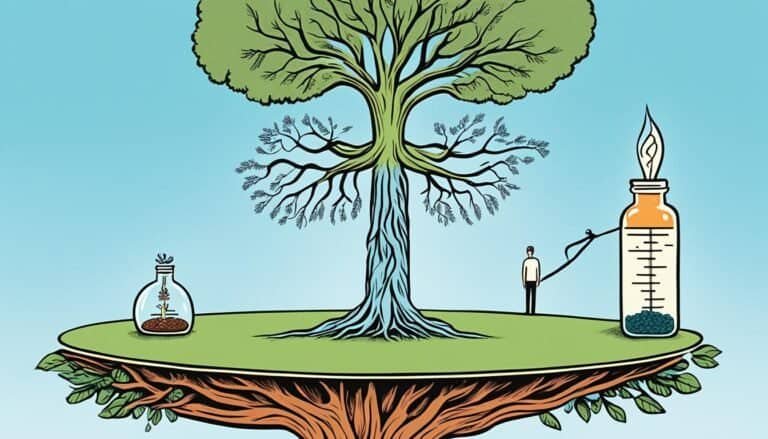Micro-Habits Vs. Quick Fixes: Why Small Changes Win Big
Choose micro-habits over quick fixes for enduring change. Small steps lead to big results in health, productivity, and well-being. Consistent effort and gradual progress are key for lasting success. Sustainable change requires long-term consistency. Break big goals into smaller tasks for motivation and productivity. Lasting habits demand patience and persistence. Embrace mindful reflection for personal growth. Harness the compound effect of small victories. Discover the power of momentum and incremental growth. Explore the transformative outcomes of choosing small changes. More insight awaits on the benefits of micro-habits over quick fixes.
Key Takeaways
- Micro-habits build consistency for lasting change.
- Quick fixes offer temporary solutions, not sustainable results.
- Small changes accumulate for significant long-term impact.
- Micro-habits require patience and persistence for success.
- Quick fixes lack the foundation for lasting habits.
The Power of Consistency
To achieve lasting change and progress, embracing the power of consistency is key. Daily routines create a foundation for lasting impact by allowing you to cultivate positive habits that accumulate over time. Small steps, when taken consistently, lead to big results. Research shows that daily routines have a profound effect on various aspects of life, from physical health to productivity and mental well-being.
Building Momentum Slowly
Building momentum slowly involves consistent effort and gradual progress towards your goals, laying a solid foundation for long-term success. By focusing on gradual improvement and celebrating small wins along the way, you can build momentum steadily and sustainably. Research shows that making small, manageable changes consistently over time is more effective than attempting drastic transformations that are difficult to maintain.
When you aim for gradual improvement, you set realistic expectations and create a sustainable path towards your objectives. Each small win you achieve boosts your confidence and motivates you to keep moving forward. These incremental victories accumulate over time, leading to significant progress and lasting changes.
Sustainable Change Over Time
When aiming for sustainable change over time, remember that long-term consistency is key to achieving lasting results.
It's the small, incremental progress that you make each day that adds up to significant changes over time.
Long-Term Consistency Key
Long-term consistency is essential for achieving sustainable changes over time. By making small steps consistently, you pave the way for gradual progress and lasting results.
Sustainable change requires a commitment to regular, ongoing efforts rather than relying on quick fixes. Research suggests that habits formed through consistent actions are more likely to stick and lead to significant transformations in the long run.
When you focus on developing micro-habits and maintaining them over time, you create a solid foundation for continuous improvement. Remember, it's the daily, consistent actions that build up over time and have a big impact on your overall progress.
Stay dedicated to your small changes, and you'll see how they accumulate into substantial, long-lasting results.
Incremental Progress Matters
Incremental progress plays a crucial role in achieving sustainable change over time. When aiming for long-term transformation, small victories can have a significant impact. Remember, slow and steady wins the race.
Here are some reasons why incremental progress matters:
- Builds Momentum: Each small step forward keeps you motivated.
- Creates Lasting Habits: Slow progress allows habits to solidify over time.
- Reduces Overwhelm: Breaking down goals into smaller tasks makes them more manageable.
- Encourages Consistency: Consistent small efforts lead to significant results.
- Fosters Patience: Embracing incremental progress teaches patience and resilience.
Breaking Down Big Goals
When aiming for significant changes, breaking down big goals into smaller, manageable chunks is a powerful strategy.
By focusing on incremental progress, you can build momentum and stay motivated as you achieve each milestone.
This approach helps create a sense of accomplishment and prevents overwhelm, making your journey towards your goal more sustainable and effective.
Goal Chunking Benefits
Chunking your goals into smaller, manageable tasks can greatly boost your motivation and productivity. When you break down big goals into smaller chunks, you make the process more manageable and less overwhelming. This approach aligns with effective goal setting and behavior modification techniques. Here are some benefits of goal chunking:
- Enhanced Focus: Breaking goals into smaller tasks helps you concentrate on one thing at a time.
- Increased Confidence: Achieving smaller tasks boosts your confidence to tackle larger ones.
- Clear Progress Tracking: Tracking progress on smaller tasks provides a sense of accomplishment.
- Reduced Procrastination: Smaller tasks are less intimidating, reducing the temptation to procrastinate.
- Improved Time Management: Chunking goals helps you allocate time more efficiently and prioritize effectively.
Incremental Progress Strategy
Breaking down big goals into smaller, manageable tasks is a strategic approach that can greatly enhance your productivity and motivation. By focusing on achieving small wins through daily actions, you can build momentum towards your larger objectives.
Research suggests that breaking tasks into smaller parts can make them seem less intimidating, increasing your likelihood of success. Celebrating these small victories along the way provides a sense of accomplishment, reinforcing positive behaviors.
Consistently taking daily actions, no matter how small, can lead to significant progress over time. This incremental progress strategy not only helps you stay motivated but also allows for adjustments and improvements as you work towards your goals.
Achieving Milestone Momentum
To effectively achieve milestone momentum in breaking down big goals, start by setting clear and specific targets for each incremental step towards your larger objective. By incorporating mindful reflection and focusing on gradual improvement, you can enhance your progress substantially.
Here are some essential steps to help you achieve milestone momentum:
- Break down your big goal into smaller, manageable tasks.
- Prioritize your tasks based on their importance and impact.
- Set realistic deadlines for each incremental step.
- Monitor your progress regularly and make adjustments as needed.
- Celebrate each milestone you reach to stay motivated and engaged in the process.
Rewiring Your Brain
To rewire your brain effectively, consistent practice of new behaviors is essential for long-lasting changes. Brain rewiring, also known as neuroplasticity, is the brain's ability to reorganize itself by forming new neural connections.
When you engage in behavior modification activities repeatedly, such as practicing mindfulness or learning a new skill, your brain adapts by creating pathways that support these activities. This process strengthens the connections associated with the desired behavior, making it easier for you to repeat it over time.
Research shows that rewiring your brain through consistent practice can lead to significant changes in behavior. For example, if you want to develop a habit of regular exercise, starting with small, achievable goals and gradually increasing intensity can help rewire your brain to associate exercise with feelings of accomplishment and well-being.
Overcoming Instant Gratification
Overcoming the allure of instant gratification requires intentional effort and a shift in mindset towards long-term benefits. When endeavoring to overcome instant gratification, consider the following:
- Delayed Gratification: Practice postponing immediate rewards for greater future gains. Recognize that waiting can lead to more substantial outcomes.
- Self-Control: Develop strategies to control impulses and resist the temptation of immediate pleasures. Strengthen your willpower through conscious decision-making.
- Patience: Cultivate a mindset that values long-term success over short-term satisfaction. Understand that good things come to those who wait and work diligently towards their goals.
- Perseverance: Embrace challenges and setbacks as opportunities for growth. Stay committed to your objectives even when faced with the allure of quick fixes.
- Mindful Choices: Make mindful decisions that align with your long-term aspirations. Reflect on the consequences of instant gratification versus delayed rewards and choose wisely.
Creating Lasting Habits
Developing lasting habits requires consistent effort and a structured approach to behavior change. Making tiny tweaks in your daily routine can lead to a lasting impact on your overall well-being. To effectively create lasting habits, it is essential to understand the power of small changes and how they can accumulate over time. Here is a table illustrating the comparison between quick fixes and lasting habits:
| Quick Fixes | Lasting Habits |
|---|---|
| Offer temporary solutions | Lead to long-term results |
| Provide immediate gratification | Require patience and persistence |
| Often unsustainable | Become ingrained in your lifestyle |
Harnessing the Compound Effect
Harnessing the compound effect involves consistently making small improvements that build up over time to create significant results. By integrating the power of daily routines and celebrating small victories along the way, you can leverage the compound effect to your advantage.
- Consistent Effort: Committing to daily actions, no matter how small, guarantees progress over time.
- Incremental Growth: Each small step taken daily contributes to gradual improvement.
- Reinforced Behaviors: Daily routines help solidify positive habits, making them more likely to stick.
- Momentum Building: Small victories create a sense of accomplishment, motivating you to keep going.
- Long-Term Impact: Over time, the cumulative effect of these small changes leads to substantial outcomes.
Embracing the Journey
To truly maximize the benefits of consistent effort and incremental growth, it is important to embrace the journey towards your goals with an open mindset and a willingness to adapt along the way. Mindful reflection on your progress allows you to appreciate how far you've come and identify areas for improvement. Celebrating small victories keeps you motivated and reinforces positive habits, making the journey more enjoyable and sustainable.
| Benefits of Embracing the Journey | How to Apply Them |
|---|---|
| Mindful Reflection | Take time regularly to assess your progress, adjust your strategies, and celebrate achievements. |
| Small Victories | Break down your goals into smaller milestones, celebrate each accomplishment, and use them as stepping stones towards your ultimate objective. |
Conclusion
You've learned the power of micro-habits over quick fixes. By focusing on small, consistent changes, you can build momentum, rewire your brain, and create lasting habits.
Embrace the journey of sustainable change over time, breaking down big goals into manageable steps. Remember, the compound effect of these small actions will lead to significant results in the long run.
So, keep up the effort, stay committed, and watch as those small changes win big.








